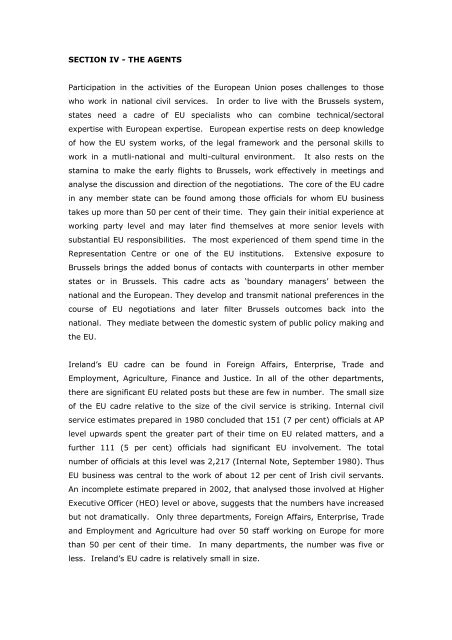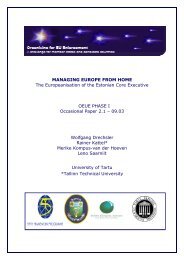Managing Europe From Home: The Europeanisation of the Irish ...
Managing Europe From Home: The Europeanisation of the Irish ...
Managing Europe From Home: The Europeanisation of the Irish ...
You also want an ePaper? Increase the reach of your titles
YUMPU automatically turns print PDFs into web optimized ePapers that Google loves.
SECTION IV - THE AGENTS<br />
Participation in <strong>the</strong> activities <strong>of</strong> <strong>the</strong> <strong>Europe</strong>an Union poses challenges to those<br />
who work in national civil services. In order to live with <strong>the</strong> Brussels system,<br />
states need a cadre <strong>of</strong> EU specialists who can combine technical/sectoral<br />
expertise with <strong>Europe</strong>an expertise. <strong>Europe</strong>an expertise rests on deep knowledge<br />
<strong>of</strong> how <strong>the</strong> EU system works, <strong>of</strong> <strong>the</strong> legal framework and <strong>the</strong> personal skills to<br />
work in a mutli-national and multi-cultural environment. It also rests on <strong>the</strong><br />
stamina to make <strong>the</strong> early flights to Brussels, work effectively in meetings and<br />
analyse <strong>the</strong> discussion and direction <strong>of</strong> <strong>the</strong> negotiations. <strong>The</strong> core <strong>of</strong> <strong>the</strong> EU cadre<br />
in any member state can be found among those <strong>of</strong>ficials for whom EU business<br />
takes up more than 50 per cent <strong>of</strong> <strong>the</strong>ir time. <strong>The</strong>y gain <strong>the</strong>ir initial experience at<br />
working party level and may later find <strong>the</strong>mselves at more senior levels with<br />
substantial EU responsibilities. <strong>The</strong> most experienced <strong>of</strong> <strong>the</strong>m spend time in <strong>the</strong><br />
Representation Centre or one <strong>of</strong> <strong>the</strong> EU institutions. Extensive exposure to<br />
Brussels brings <strong>the</strong> added bonus <strong>of</strong> contacts with counterparts in o<strong>the</strong>r member<br />
states or in Brussels. This cadre acts as ‘boundary managers’ between <strong>the</strong><br />
national and <strong>the</strong> <strong>Europe</strong>an. <strong>The</strong>y develop and transmit national preferences in <strong>the</strong><br />
course <strong>of</strong> EU negotiations and later filter Brussels outcomes back into <strong>the</strong><br />
national. <strong>The</strong>y mediate between <strong>the</strong> domestic system <strong>of</strong> public policy making and<br />
<strong>the</strong> EU.<br />
Ireland’s EU cadre can be found in Foreign Affairs, Enterprise, Trade and<br />
Employment, Agriculture, Finance and Justice. In all <strong>of</strong> <strong>the</strong> o<strong>the</strong>r departments,<br />
<strong>the</strong>re are significant EU related posts but <strong>the</strong>se are few in number. <strong>The</strong> small size<br />
<strong>of</strong> <strong>the</strong> EU cadre relative to <strong>the</strong> size <strong>of</strong> <strong>the</strong> civil service is striking. Internal civil<br />
service estimates prepared in 1980 concluded that 151 (7 per cent) <strong>of</strong>ficials at AP<br />
level upwards spent <strong>the</strong> greater part <strong>of</strong> <strong>the</strong>ir time on EU related matters, and a<br />
fur<strong>the</strong>r 111 (5 per cent) <strong>of</strong>ficials had significant EU involvement. <strong>The</strong> total<br />
number <strong>of</strong> <strong>of</strong>ficials at this level was 2,217 (Internal Note, September 1980). Thus<br />
EU business was central to <strong>the</strong> work <strong>of</strong> about 12 per cent <strong>of</strong> <strong>Irish</strong> civil servants.<br />
An incomplete estimate prepared in 2002, that analysed those involved at Higher<br />
Executive Officer (HEO) level or above, suggests that <strong>the</strong> numbers have increased<br />
but not dramatically. Only three departments, Foreign Affairs, Enterprise, Trade<br />
and Employment and Agriculture had over 50 staff working on <strong>Europe</strong> for more<br />
than 50 per cent <strong>of</strong> <strong>the</strong>ir time. In many departments, <strong>the</strong> number was five or<br />
less. Ireland’s EU cadre is relatively small in size.



